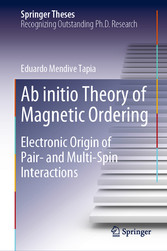Suchen und Finden
Service

Ab initio Theory of Magnetic Ordering - Electronic Origin of Pair- and Multi-Spin Interactions
Eduardo Mendive Tapia
Verlag Springer-Verlag, 2020
ISBN 9783030372385 , 131 Seiten
Format PDF
Kopierschutz Wasserzeichen
Geräte
Mehr zum Inhalt

Ab initio Theory of Magnetic Ordering - Electronic Origin of Pair- and Multi-Spin Interactions
Many technological applications exploit a variety of magnetic structures, or magnetic phases, to produce and optimise solid-state functionality. However, most research advances are restricted to a reduced number of phases owing to computational and resource constraints. This thesis presents an ab-initio theory to efficiently describe complex magnetic phases and their temperature-dependent properties.
The central assumption is that magnetic phases evolve slowly compared with the underlying electronic structure from which they emerge. By describing how the electronic structure adapts to the type and extent of magnetic order, a theory able to describe multi-spin correlations and their effect on the magnetism at finite temperature is obtained.
It is shown that multi-spin correlations are behind the temperature and magnetic field dependence of the diverse magnetism in the heavy rare earth elements. Magnetically frustrated Mn-based materials and the effect of strain are also investigated. These studies demonstrate that the performance of solid-state refrigeration can be enhanced by multi-spin effects.
Eduardo Mendive Tapia's first research experience was made possible by a Departmental Collaboration Fellowship at the University of Barcelona, where he also obtained his Bachelor in Physics. After completing a master on spintronics at the university of Nottingham, he started a PhD at the University of Warwick under the wise guidance of Prof. Julie B. Staunton. From her he learned deep aspects of the theory of magnetism at finite temperature, which inspired him to study multi-spin interactions and their use for solid-state cooling technology. Following a short-term DAAD grant to work at Forschungszentrum Jülich, Eduardo became a postdoctoral researcher at the Max-Planck-Institut in Düsseldorf, where he continues to research on magnetism and refrigeration.
Shop

